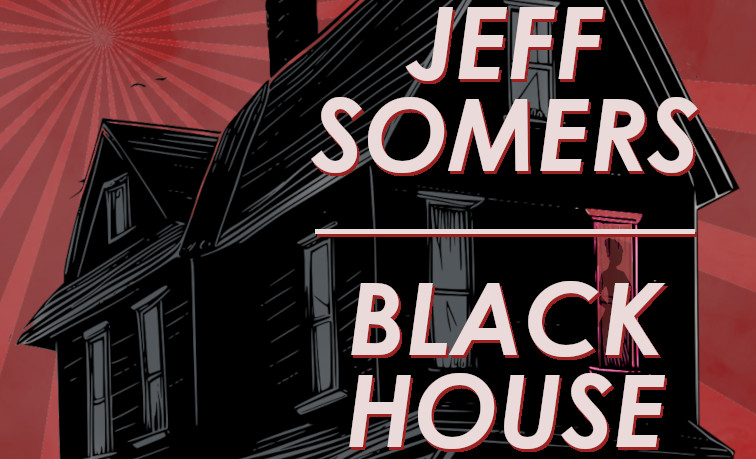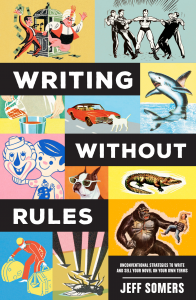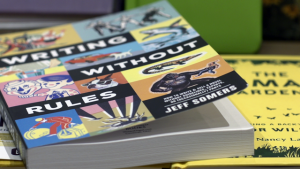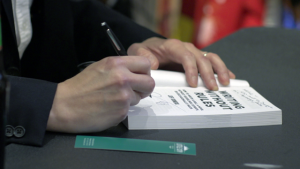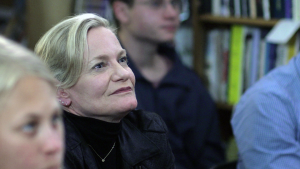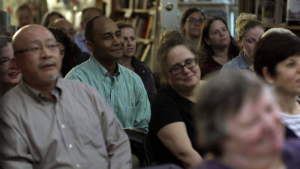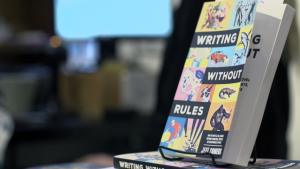As has become hallowed tradition, I’ll be posting my novel BLACK HOUSE on this blog one chapter per week in 2024.
22. A New Room
Marks opened his eyes. Had he actually fallen asleep? He startled forward, adrenaline pouring into his blood, and then froze, because it was completely silent. There wasn’t a hint of noise. After a moment he leaned back against the wall, feeling stiff. He smiled grimly and looked up at the ceiling.
“Dirty pool,” he whispered.
He didn’t know if Agnes was the owner of this awful place, the proprietor, or if she was an employee, but he’d taken to picturing her in the former capacity. In his memory, her beauty had taken on a brittle, theatrical tone, like a stage performer her looked beautiful and ethereal from a distance but was revealed as an illusion of thick makeup, shadows, and lighting when you got up close.
He let Dennis and Dee sleep. Dennis was propped up against the wall like Marks, and Dee lay sprawled on the hard floor. They both looked peaceful, and he knew the moment they woke up it would be back to the exhausting attempt to find their way out of this place. He told himself again that there had to be a way out. There had to be. It simply wasn’t possible that they’d been trapped in some hellish, otherworldly place that had no rules, no chance.
He nodded to himself, firmly.
“It’s so quiet.”
He turned and looked at Dennis, who still looked like a man who needed plenty of rest. “We got played. It was just making us run.”
“Son of a bitch,” Dennis said, sounding tired and not at all angry. “Anything left to eat?”
Marks rummaged in the backpack. “Two stale donuts, a power bar.” He pulled them out. “Might as well divide them up. Won’t do us any good unless we eat them.”
Dee woke up and they sat for a while eating what Marks comfortably considered the worst breakfast he’d ever had, passing around a bottle of water. When it was gone he shouldered the backpack and stood up. Dee looked up at him. “You got any ideas, Mr. Marks? Because it seems to me, we don’t get out of this place soon, we gonna fucking starve to death. And if we don’t get out of this maze of shitty rooms, we can’t get out of the larger place, right?”
He nodded. “There’s a way into this maze, so there’s a way out. All mazes are arranged in specific ways. This isn’t some hedge maze or corn maze—you know, the squiggly-line kind of mazes you find in puzzle books. This is a homogeneous room maze, where every room looks the same. Disorienting. So we have to stop looking at the rooms. The rooms are designed to be confusing, so stop looking at them and use an algorithm to choose your path.” He knelt down again, pulling the notebook from the backpack.
“You go to school for this, Marks?” Dennis asked tiredly.
“Look.” Marks quickly sketched four boxes on a page, then linked the boxes with lines stemming from their corners and sides. “There has to be an edge. If we keep heading in one direction, then switch to a ninety-degree angle when we can’t go in that direction any more, then switch to the far corner when we can’t go that way any more, and go around counter-clockwise or clockwise from there, eventually we make it to the perimeter. And the exit has to be on the perimeter somewhere. Or should be.”
Dennis and Dee both sighed. “All right,” Dee said, standing up. She couldn’t summon any actual enthusiasm for the idea. She suspected, strongly, that Marks was wrong and there were no rules. But she wasn’t ready to just sit down and give up, and so she was willing to try it.
Marks stood in the center of the room and chose the diagonal leading away to his right. In the next room he did the same, and so they followed what seemed like a straight line, cutting diagonally through room after room, each one exactly like the others. It remained incredibly quiet. They could hear their own heavy breathing and the scrape of their shoes on the rough plywood floors.
“What’s that, fifty?” Dennis asked after a while, wiping sweat from his face. “Sixty rooms?”
Marks nodded. “Seventy-three,” he said.
They walked on.
Marks wasn’t sure what was worse—the terror of the day before, fleeing from something unseen and monstrous, exhausted and horrified, or this silent plodding. They had nothing to say to each other and nothing to do but walk on and on. They didn’t even have any refreshments of any kind, aside from a half bottle of water. If they didn’t find their way out of the maze very soon, Marks knew they would simply die of thirst sitting on the floor of one of these maddening, identical rooms.
He wasn’t sure he remembered what he’d thought about his own demise prior to his … derangement, his tragedy, his brain injury, whatever it would be classified, but he doubted he’d ever expected to die sitting on the floor of a maze of unfinished new construction.
They walked on.
It was getting hotter. This became obvious as they walked, the air becoming jellied and heavy, sweat streaming from them. He called a break and passed the bottle around, and they all took tentative, unsatisfying sips. Then they walked on.
By the time they entered the room that no longer had an exit in the corner diagonally across from them, they’d all removed whatever layers they could, stuffing them into Marks’ bag. They were all soaked with sweat, and the rooms were like ovens, sizzling with a wet, damp heat. Marks imagined mold growing all over himself.
They stood and stared at the corner for a moment.
“All right,” Marks said. “Ninety degrees left.” He turned and walked towards the doorway.
They walked on.
No one spoke. Marks had lost count of the hours and the rooms; his last note, smeared by a sweaty hand, had over three hundred rooms. He couldn’t be certain that tricks weren’t involved, that Agnes might have found a way of switching around the rooms, or removing doors, or other pranks. He suspected, still, that this wouldn’t be allowed, but he was less and less confident of his muddled memories of the past, of the things about this strange, violent world he found himself in that he’d assumed he’d once found so familiar. He worried, silently, that in his arrogant assumption that his broken brain was serving up reliable information he’d gotten them all killed.
They walked on.
It became a sort of trance, just watching his own feet go one in front of the other, glancing up to spot the door on the opposite side of the new room and advancing on it. When they entered a room with no door on the opposite wall, Marks shuffled to a stop and stared dumbly for a moment.
“We’re at the far corner.”
There was no doorway in the corner, or ahead of them, or to their right. Marks’ thoughts felt thick and cloudy, but he imagined such a room and thought it must be in the northeast corner, which meant if they now turned to their left and kept going in a straight line, they would remain on the perimeter. Which would either lead them to the exit, or trap them even more firmly.
“If I’m right,” he said slowly, his mouth dry, “when we enter a room and there’s a doorway to our right, that’s the way out.”
Dennis and Dee said nothing. After a moment, Marks staggered for the doorway to their left, and didn’t turn to ensure they followed.
They walked on.
Marks stopped thinking. It hadn’t been that long, he didn’t think, but these new rooms had become his whole universe. At regular, drum-like intervals they crossed a threshold and the room beyond was the same as the room they’d just left, and it was easy to imagine that the rooms were gliding on casters or rails, moving the moment they stepped through the portal and gliding soundlessly around to become the next room in the progression.
And then they stepped into a room and there was a doorway leading diagonally off to their right.
He almost walked right past it, his eyes locked on the wall directly in front of him, even though there was no doorway. He stared dully and walked shamblingly until Dee’s voice stopped him.
“Hey!”
He turned back to tell her nothing mattered except getting to the next room, and the next room, and saw what she was looking at. Relief flooded him. He’d been right, and more than simply being right it proved this place, this black, terrible place, had rules. And he could perceive them. Or interpret them. Or make them, for all he knew, but for the moment he didn’t care. He started walking towards the doorway, and he knew that if he stepped through and found another newly built room smelling of damp joint compound, he would start laughing and he wouldn’t be able to stop, ever, and if this was an Insanity Engine it would be mission accomplished, well done.
He walked briskly. He stepped through, and felt the air change: He was in a hallway, and his heart started to pound. It was different. The hallway began with the same new construction palette, but slowly morphed into a finished space with rich wooden walls and flooring, leading to one of the heavy doors he’d gotten used to seeing. There was a carving in the center, but he didn’t even look at it, charging forward in desperate hope and crashing through, stopping in shock.
“Welcome!” Agnes said. Then she frowned, prettily. “Oh. You again.”
EPUB | MOBI | PDF


